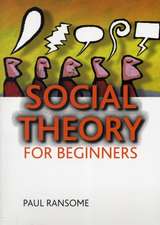Distributive and Procedural Justice: Research and Social Applications
Autor Kjell Törnblom, Riël Vermunten Limba Engleză Paperback – 15 noi 2016
| Toate formatele și edițiile | Preț | Express |
|---|---|---|
| Paperback (1) | 459.90 lei 43-57 zile | |
| Taylor & Francis – 15 noi 2016 | 459.90 lei 43-57 zile | |
| Hardback (1) | 1037.19 lei 43-57 zile | |
| Taylor & Francis – 28 aug 2007 | 1037.19 lei 43-57 zile |
Preț: 459.90 lei
Nou
Puncte Express: 690
Preț estimativ în valută:
88.02€ • 91.43$ • 73.11£
88.02€ • 91.43$ • 73.11£
Carte tipărită la comandă
Livrare economică 03-17 februarie 25
Preluare comenzi: 021 569.72.76
Specificații
ISBN-13: 9781138264526
ISBN-10: 1138264520
Pagini: 292
Dimensiuni: 156 x 234 mm
Greutate: 0.45 kg
Ediția:1
Editura: Taylor & Francis
Colecția Routledge
Locul publicării:Oxford, United Kingdom
ISBN-10: 1138264520
Pagini: 292
Dimensiuni: 156 x 234 mm
Greutate: 0.45 kg
Ediția:1
Editura: Taylor & Francis
Colecția Routledge
Locul publicării:Oxford, United Kingdom
Cuprins
Contents: Introduction: Distributive and procedural justice, Riël Vermunt and Kjell Y. Törnblom; Part I Distributive Justice: The reciprocal relationship between affect and perceptions of fairness, Elizabeth Mullen; Toward a resource production theory of distributive justice, Kjell Y. Törnbolm and Ali Kazemi; Just solidarity: how justice conditions intergenerational solidarity, Steffen Mau and Sonja Wrobel. Part II Procedural Justice: Why do people care about procedural fairness? The importance of membership monitoring, Celia M. Gonzalez and Tom R. Tyler; The effects of procedural unfairness on norm-violating behavior, Jacqueline Modde and Riël Vermunt; Interactions between procedural fairness and outcome favorability in conflict situations, Markus M. Müller and Elizabeth Kals. Part III Distributive and Procedural Justice: Distributive and procedural fairness promote cooperative conflict management, Ali Kazemi; The talk of negotiators: shaping the fairness of the process and outcome, Karen A. Hegtvedt.; Social injustice in Indian country: historical antecedents of current issues, Laurence Armand French and Nancy Picthall-French. Part IV Distributive and Procedural Justice Research: Epistemology, Method and Application: Subjective impartiality: justice judgments between morality and self-interest, Holger Lengfeld; Studying justice: measurement, estimation, and analysis of the actual reward and the just reward, Guillermina Jasso; Justice conflicts and the justice of conflict resolution, Leo Montada; Index.
Notă biografică
Professors Kjell Törnblom and Riël Vermunt are based in the Department of Social Psychology at the University of Skövde, Sweden. They have published widely in the field of justice and related areas.
Recenzii
'An important, up to date discussion of theory and research on distributive and procedural justice with stimulating suggestions for future work. Especially attractive is the inclusion of chapters linking basic theory and research to such issues as intergenerational solidarity, interpersonal conflict, and historical injustices. The final section on methodological and theoretical issues is capped by Leo Montada's thoughtful, discriminating, and critical reflection on "justice(s)" and their vexed relations with the resolution of conflict.' Ron Cohen, Bennington College,USA 'Kjell Törnblom and Riël Vermunt have assembled a series of concise and focussed chapters covering a wide-range of research on social justice. The creative and inspired thinking found in this volume will provide influential food for thought for justice researchers as they continue to examine this fundamental aspect of daily functioning.' Dirk D. Steiner, Université de Nice-Sophia Antipolis, France
Descriere
This interdisciplinary and cross-national volume brings together theory and research by prominent scholars within the areas of distributive and procedural justice, not only featuring work within each area separately, as is commonly done, but also showing how combinations of the two justice orientations might operate to affect justice judgments and guide behaviour.













